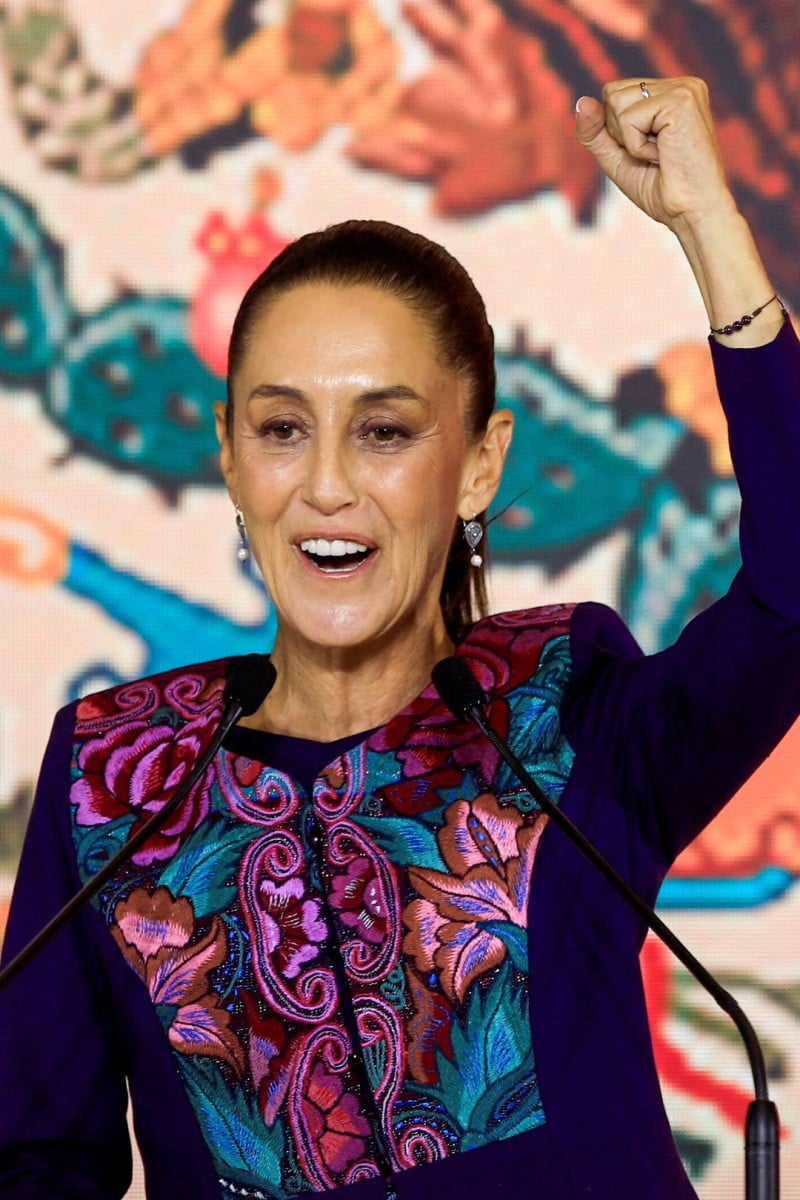
Claudia Sheinbaum makes history as Mexico’s first female president and leader from a Jewish background
- National Electoral Institute says the 61-year-old had between 58.3 per cent and 60.7 per cent of the vote; term begins on October 1
- Nearly 100 million people were registered to vote and turnout appeared to be about 60 per cent
 Mexico elects Claudia Sheinbaum as its first woman president. Photo: Reuters
Mexico elects Claudia Sheinbaum as its first woman president. Photo: ReutersMexico is set to get its first woman president in its 200-year history with projected presidential winner Claudia Sheinbaum.
“I will become the first woman president of Mexico,” Sheinbaum said with a smile, speaking at a downtown hotel shortly after electoral authorities announced a statistical sample showed she held an irreversible lead. “We’ve all made it, with our heroines who gave us our homeland, with our mothers, our daughters and our granddaughters.”
“We have demonstrated that Mexico is a democratic country with peaceful elections,” she said.
The National Electoral Institute’s president said Sheinbaum had between 58.3 per cent and 60.7 per cent of the vote, according to a statistical sample. Sheinbaum’s Morena party was also projected to hold majorities in both chambers of Congress.
The climate scientist and former Mexico City mayor said that her two competitors had called her and conceded her victory.
The fact that the two leading candidates were women had left little doubt that Mexico would make history. Sheinbaum will also be the first person from a Jewish background to lead the overwhelmingly Catholic country.
She will start her six-year term on October 1. Mexico’s constitution does not allow re-election.
The leftist has said she believes the government has a strong role to play in addressing economic inequality and providing a sturdy social safety net.
Sheinbaum’s her victory suggests that the political movement López Obrador created will live on after his presidency. If the margin holds it would approach his landslide victory in 2018.
Still, Sheinbaum is unlikely to enjoy the kind of unquestioning devotion that López Obrador has enjoyed.
In Mexico City’s colonial-era main plaza, the Zocalo, Sheinbaum’s win did not draw the kind of cheering, jubilant crowds that greeted López Obrador’s victory in 2018. Those present were enthusiastic, but comparatively few in number.
“I promise that I am not going to let you down,” Sheinbaum said, once she arrived in the plaza.
The main opposition candidate, Gálvez, a tech entrepreneur and former senator, had promised to take a more aggressive approach toward organised crime.
In her concession speech, she said “I want to stress that my recognition [of Sheinbaum’s victory] comes with a firm demand for results and solutions to the country’s serious problems.”
Nearly 100 million people were registered to vote and turnout appeared to be about 60 per cent, similar to earlier elections.
Amid heatwave in Mexico, howler monkeys are falling dead from trees
Sheinbaum promised to continue all of López Obrador’s policies, including a universal pension for the elderly and a programme that pays youths to apprentice.
The persistent cartel violence and Mexico’s middling economic performance were the main issues on voters’ minds.
López Obrador claims to have reduced historically high homicide levels by 20 per cent since he took office in December 2018. But that’s largely a claim based on a questionable reading of statistics. The real homicide rate appears to have declined by only about 4 per cent in six years.
The upcoming November rematch between US President Joe Biden and former President Donald Trump has underscored deep divisions in the US. Similarly, Sunday’s election revealed how severely polarised public opinion is in Mexico over the direction of the country, including its security strategy and how to grow the economy.